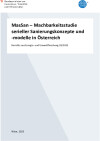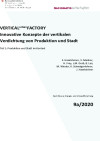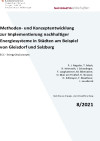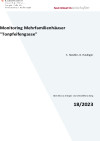Suchergebnisse
VERTICAL urban FACTORY
Das Projekt beforscht Möglichkeiten und Potenziale hocheffizienter Raumnutzung durch moderne Konzepte „gestapelter“ Funktionen und vertikaler Produktion.
VERTICALurbanFACTORY
The project researches possibilities and potentials of highly efficient use of space through modern concepts of "stacked" functions and vertical production.
INNERGY - Reallabor im zentralen Inntal für klimaneutrale semiurbane Gebiete
Die Potentiale von Bestandsquartieren und Industriebetrieben für eine nachhaltige Energieversorgung wurden in einem kleinstrukturierten Gebiet ganzheitlich und sektorenübergreifend erhoben und konkrete Umsetzungsprojekte für eine klimaneutrale Region ausgearbeitet.
plusenergy-FLAGSHIP: Plusenergie-Bürogebäude 2.0 - die viadonau Unternehmenszentrale
Für die neue Unternehmenszentrale der viadonau (via donau - Österreichische Wasserstraßen-Gesellschaft m.b.H.) sollen im Zuge des gegenständlichen Projekts verschiedene Innovationen in Richtung eines „Plus-Energie Standard 2.0“ umgesetzt und in einem Gesamtkonzept vereint werden.
plusenergy-FLAGSHIP: Plus-Energy office building 2.0 - the viadonau headquarters
In the course of this project, various innovations towards a "Plus-Energy Standard 2.0" are to be implemented and combined in an overall concept for the new viadonau headquarters (via donau - Österreichische Wasserstraßen-Gesellschaft m.b.H.).
INNERGY - Real laboratory in the central Inn-valley for climate-neutral semi-urban areas
Sustainable energy supply solutions for existing quarters and industry had been surveyed holistically and cross-sectorally in a small-structured area, consequently pilot projects had been elaborated with the aim to build up a climate-neutral region.
EnergyCityConcepts (ECC) - Methoden- und Konzeptentwicklung zur Implementierung nachhaltiger Energiesysteme in Städten am Beispiel von Gleisdorf und Salzburg
Im gegenständlichen Projektvorhaben werden anhand zweier konkreter Modellregionen (Kleinstadt Gleisdorf und urbanes Stadtquartier Salzburg-Schallmoos) neue methodische Herangehensweisen (interdisziplinäre Energieraumplanung, Modellbildung und Simulation) entwickelt und erprobt. Die beiden Modellregionen verbindet dabei das ambitionierte politische Bekenntnis zu einer 100 % erneuerbaren bzw. CO2-neutralen Energieversorgung.
ECC – EnergyCityConcepts – Development of a methodology and concept for the implementation of sustainable energy systems in cities by the example of Gleisdorf and Salzburg
In the context of this project two concrete model regions (small city Gleisdorf and urban city quarter Salzburg-Schallmoos) will be developed and tested with new methodical approaches (interdisciplinary urban and regional energy planning, modeling and simulation). An ambitious political commitment of both model regions is a 100% renewable or rather CO2-neutral energy supply.
Storage Cascade MZ: Storage cascade system to establish urban PLUS energy systems on the example of the city of Mürzzuschlag
In the "Storage Cascade MZ" project, battery storage systems are implemented on different grid levels in the city of Mürzzuschlag, whose measurement data enable an integrated grid monitoring and create the basis for a future expansion of the nominal power of photovoltaic (pv) systems.
VERTICAL FARMING - Ermittlung der Anforderungsbedingungen zur Entwicklung eines Vertical Farm Prototyps zur Kulturpflanzenproduktion
Im Mittelpunkt stand die Erforschung von Grundlagen für eine neue Gebäudetypologie, der Vertikalen Farm. Urbane vertikale Lebensmittelproduktion kann zur Steigerung der Energieeffizienz von und zur Reduktion des Landverbrauchs durch Städte beitragen. Wesentliche Einflussfaktoren zur Erreichung dieser Ziele werden durch diese Grundlagenforschung offen gelegt.
Energiemosaik Austria - Österreichweite Modellierung und webbasierte Visualisierung von Energieverbrauch und CO2-Emissionen auf Gemeindeebene
Inhalt des Projektes ist eine alle Nutzungs- und Mobilitätsarten umfassende Modellierung und webbasierte Visualisierung von Energieverbrauch und Treibhausgasemissionen aller österreichischen Gemeinden. Die Ergebnisse können in zahlreiche energie- und klimarelevante Handlungsfelder integriert und für die Sensibilisierung von Entscheidungsträgern und Öffentlichkeit genutzt werden.
Energy Mosaic Austria - Austrianwide modelling and web-based visualisation of energy consumption and greenhouse gas emissions on local level
The project consists of a modelling and a web-based visualisation of energy consumption and greenhouse gas emissions of all Austrian cities and municipalities considering all kinds of land use and mobility. The results deliver a sound basis for numerous energy and climate relevant fields of action and for awareness raising of decision makers and the public.
MasSan - Machbarkeitsstudie serieller Sanierungskonzepte & -modelle in Österreich

Machbarkeitsstudie zur Darstellung und Analyse der Rahmenbedingungen und Potentiale von seriellen Sanierungen großvolumiger Bauten. Dabei werden die Erkenntnisse aus nationalen Pilot-Projekten sowie von internationalen Projekten und Erfolgsmodellen extrahiert und auf ihre Umsetzbarkeit im österreichischen Kontext geprüft, bzw. die benötigten Erfordernisse für eine schnelle Verbreitung aufbereitet.
Schriftenreihe
29/2025
H. Grief, C. Ninaus, AEE Intec M. Ploss, T. Roßkopf-Nachbaur, W. Amann, A. Mundt, S. Formanek, S. Fuchs, I. Mühlbauer, Ulla Unzeitig, C. Weiser
Herausgeber: BMIMI
Deutsch, 113 Seiten
Downloads zur Publikation
VERTICALurbanFACTORY: Innovative Konzepte der vertikalen Verdichtung von Produktion und Stadt

Das Projekt beforscht Möglichkeiten und Potenziale hocheffizienter Raumnutzung durch moderne Konzepte „gestapelter“ Funktionen und vertikaler Produktion.
Schriftenreihe
9/2020
E. Haselsteiner, V. Madner, H. Frey, L.M. Grob, B. Laa, M. Winder, K. Schwaigerlehner, J. Haselsteiner
Herausgeber: BMK
Deutsch, 253, 153 bzw. 52 Seiten
Downloads zur Publikation
Methoden- und Konzeptentwicklung zur Implementierung nachhaltiger Energiesysteme in Städten am Beispiel von Gleisdorf und Salzburg (ECC - EnergyCityConcepts)

Im gegenständlichen Projektvorhaben werden anhand zweier konkreter Modellregionen (Kleinstadt Gleisdorf und urbanes Stadtquartier Salzburg-Schallmoos) neue methodische Herangehensweisen (interdisziplinäre Energieraumplanung, Modellbildung und Simulation) entwickelt und erprobt. Die beiden Modellregionen verbindet dabei das ambitionierte politische Bekenntnis zu einer 100 % erneuerbaren bzw. CO2-neutralen Energieversorgung.
Schriftenreihe
8/2021
P. J. Nageler, T. Mach, R. Heimrath, I. Schardinger, F. Langhammer, M. Biberacher, O. Mair am Tinkhof, H. Strasser, H. Edtmayer, F. Mauthner, I. Leusbrock
Herausgeber: BMK
Deutsch, 141 Seiten
Downloads zur Publikation
Monitoring Mehrfamilienhäuser "Tonpfeifengasse"

Messtechnische Begleitung und Bewertung der Funktionsweise von Bauteilaktivierung als Speicher für Umweltenergien am Beispiel der Wohnhausanlage Tonpfeiffengasse.
Schriftenreihe
18/2023
S. Handler, G. Haslinger
Herausgeber: BMK
Deutsch, 72 Seiten
Downloads zur Publikation
DALEC - Day- and Artificial Light with Energy Calculation
Entwicklung eines Online-Konzeptanalysetool für ArchitektInnen, BauingenieurInnen, LichtplanerInnen und Bauherrn, welches trotz einer einfachen Handhabung und kurzen Berechnungszeiten, die komplexen lichttechnischen und thermischen Vorgänge in einem Gebäude abbildet und Heiz-, Kühl- und Kunstlichtbedarf anschaulich bewertet. Zudem wurde das Nutzerverhalten (z.B. Blendschutz) berücksichtigt und visuelle und thermische Komfortkriterien analysiert. Diese neuartige und innovative, gesamtheitliche Betrachtung ermöglicht eine nachhaltige und energieeffiziente Entwurfsplanung für Neubau und Sanierung.
Digital transformation of the Austrian construction industry and its impact on employment
What are the impacts of the digital transformation of the Austrian construction industry on this sector’s labour market? By looking at the next five to ten years it will be analysed whether and to what extent digital applications lead to an increasing, falling or stagnant demand for employees in the construction industry and in construction occupations.
M-DAB2: Materialintensität der Innenentwicklung - Ressourcenbewertung und Lokalisierung städtischer Entwicklungspotenziale
Bei der Bewertung von Innenentwicklungspotenzialen wurde erstmals auch die Materialintensität der Innenentwicklung (anfallende Stoffmengen) für unterschiedliche Entwicklungsvarianten berücksichtigt. Dabei wurde ein Methodenset zur holistischen Bewertung von Potenzialflächen und verschiedene Entwicklungsvarianten und -szenarien zur ressourcenschonenden Innenentwicklung geschaffen.
REGOreal - 100% Erneuerbare Energie Region: Lokale Energie Gemeinwohl Oekonomie im Reallabor für vernetzte Energie- und Mobilitätszellen
In REGOreal geschieht die Sondierung für eine 100% Erneuerbare Energieregion im Raum Retz-Horn-Krems-Tulln (NÖ) sowie Mallnitz (Ktn). Es gibt vier Fokusthemen: 100 Erneuerbare Energie-Gemeinschaften (EEG), 1.000 Gebäudesanierungen, 10.000 Energie-Exporteure und -Exporteurinnen (im Sinne der Mitarbeiter:innen, welche den Ansatz ins private Umfeld tragen) und 100.000.000 km nachhaltiger Mobilität mit umfassender Nutzung von IT für die Entwicklung lokaler integrierter Energyiesysteme (IES) zur Einbindung eines bunten Mix unterschiedlicher Akteure und Akteurinnen und Objekte.
